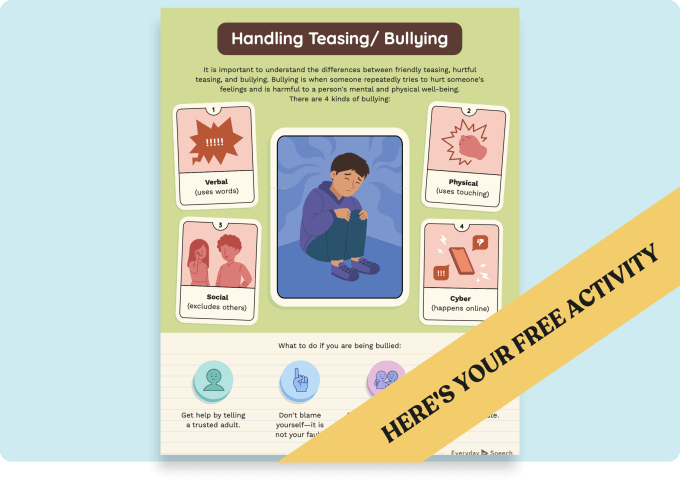Teaching Conversation Skills to Elementary Students: A No-Prep Activity
Get free social skills materials
No-prep lessons on self-regulation, emotional recognition, conversation skills, and more.
Sign up hereIntroduction
Effective conversation skills are essential for children to form strong social connections and engage with others. By teaching these skills to elementary students, educators can help them become better communicators and enhance their social-emotional development. In this blog post, we will discuss a simple no-prep activity that educators can use to teach children how to stay on topic during conversations, as well as some discussion questions and related skills to further their learning.
No-Prep Activity: The Topic Train
This activity is designed to help students practice staying on topic during conversations. It requires no preparation or materials from the educator, making it easy to implement in any classroom setting.
- Ask the students to form a circle and explain that they will be participating in a conversation game called “The Topic Train.”
- Choose a student to start the conversation by mentioning a topic. For example, the student might say, “I went to the zoo last weekend.”
- Going clockwise around the circle, each student must contribute to the conversation by making a comment or asking a question related to the topic. For instance, another student might say, “What animals did you see at the zoo?”
- The conversation continues around the circle until every student has had a turn. Encourage students to listen carefully to each other and stay on topic.
- After everyone has participated, choose a new student to start the conversation with a different topic. Repeat the activity several times to give students ample practice staying on topic during conversations.
Discussion Questions
After completing the activity, use these questions to stimulate further discussion about conversation skills and staying on topic:
- Why is it important to stay on topic during a conversation?
- How does staying on topic help us build better relationships with others?
- What strategies can you use to stay on topic if you’re unsure what to say next?
- How does active listening play a role in maintaining a conversation?
- Can you think of a time when you had a conversation that went off-topic? How did it make you feel?
Related Skills
In addition to staying on topic, there are other essential conversation skills that can help students improve their social interactions. Some of these skills include:
- Active listening: Paying close attention to what others are saying and responding appropriately.
- Asking open-ended questions: Encouraging deeper conversations by asking questions that require more than a yes or no answer.
- Nonverbal communication: Using body language, facial expressions, and gestures to convey meaning and show interest in the conversation.
- Empathy: Understanding and sharing the feelings of others during a conversation.
- Turn-taking: Allowing others to speak and not dominating the conversation.
Next Steps
Teaching conversation skills to elementary students can significantly impact their social-emotional development and help them form strong relationships with their peers. By incorporating activities like the Topic Train and discussing related skills, educators can provide students with the tools they need to become effective communicators.
To access more resources and activities that can help teach conversation skills and other essential social-emotional learning concepts, sign up for free samples at Everyday Speech. These materials can provide educators with valuable tools to support their students’ growth and development in various aspects of social-emotional learning.

